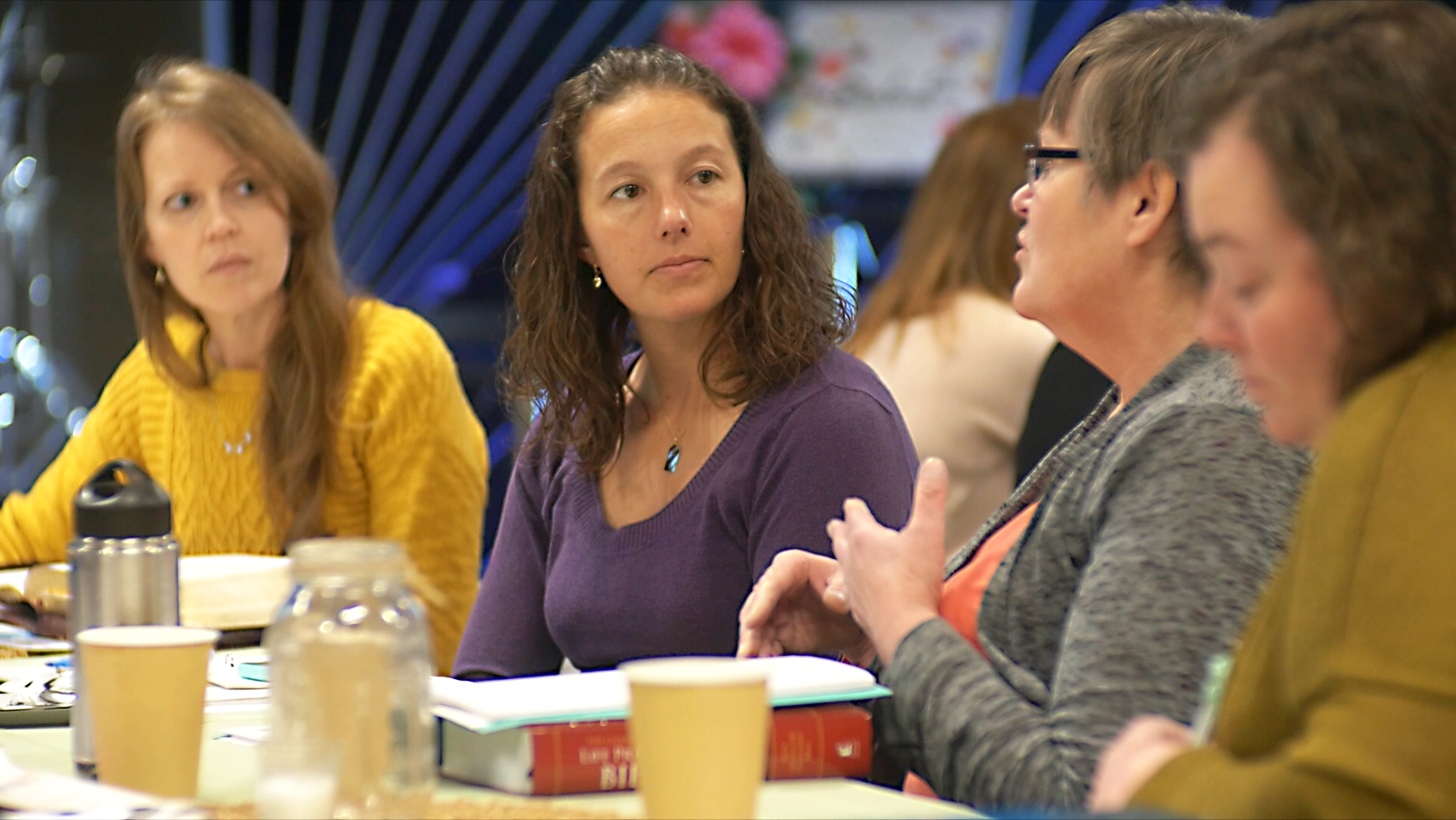UPCOMING EVENTS
- Weekly Men's Study February 26, 2026 Both Sites
- Weekly Men's Study February 27, 2026 Both Sites
- Church Service - Saturday 6pm February 28, 2026 Main Auditorium
6 Takeaways from Second Timothy
Mandy Youtz | Article & CFC Features | Legacy
In April the women’s ministry at CFC wrapped up our study of Second Timothy. Mandy Moore, the Women’s Ministry Director, and Jennie Herclerode led us through eight weeks of challenging lessons.
Second Timothy is relatively short book of the Bible, but it is full of wisdom and instruction. As I’ve attempted to summarize what I’ve taken away from this study, I realized that there is much more than I can include in a single post.
God’s word reveals something new to me each day that I dive in, and often in ways that aren’t easily summarized or contained. Still, I’ll do my best to share the lessons that stood out to me the most over these eight weeks.
First, here’s a little background information:
The book of 2 Timothy is a letter written by Paul the apostle. He writes to Timothy, who he refers to as his “son in the faith” (1 Timothy 1:2). The letter is written while Paul is in prison and nearing the end of his life, probably around AD 66 or 67.
My key takeaways
1. We should fan the flame of God’s gift.
In 2 Timothy 1:6-7, Paul reminds Timothy to “fan into flame the gift of God, which is in you through the laying on of my hands, for God gave us a spirit not of fear but of power and love and self-control.”
This is interesting because Timothy had already shown that he was very faithful and dedicated to ministry and yet, Paul had this important exhortation for him. What does that say to us about how we should be living our own lives? What does it say to us about our faith?
Application: Our faith is going to take dedication and perseverance. We need to be careful not to become stagnant but to pursue God even when it’s uncomfortable. We don’t want to look back on our lives five years from now and realize that we haven’t grown. As Mandy put it, “In five years, you don’t want to be the same Christian woman you are now.” We all have room to grow and we need to be intentional about fanning the flame of our faith.
2. We should guard the good deposit.
In 2 Timothy 1:14, Paul writes “By the Holy Spirit who dwells within us, guard the good deposit entrusted to you.” The good deposit is the good news, the news that Jesus is the Messiah and has paid the price for our sin by dying on the cross and then rising again.
Guarding the good news includes passing it on! We are not meant to hide it. Specifically, we are to pass it on to those who are faithful, available, and teachable. We are also called to develop those traits in our own lives.
I’ll admit, these types of passages often overwhelm me. While I want to know what I should be doing with my life, I feel like I’ll never have the strength to do what I know I should. But what does the beginning of this passage say again?
“By the Holy Spirit who dwells within us.”
I don’t have to be scared or overwhelmed because I’m not meant to do this alone. God is going to do the work. I don’t need to rely on my own strength, but his. I just need to be faithful, available, and teachable.
Application: We should be looking for opportunities to pass on the good news. That means tuning into God through his word and constant prayer and allowing ourselves to be led by the Holy Spirit.
3. We need to rightly handle the Word.
In 2 Timothy chapter 2, Paul warns us to stay away from “irreverent babble” and to avoid quarreling over words. He also makes it clear that false teaching cannot be tolerated, describing it as a gangrene that infects the hearers.
How do we avoid irreverent babble and ensure that we are not taking part in false teaching? We rightly handle God’s word. To do that, we need to be dedicated to spending time in the Word and learning what it says for ourselves. We can’t rely on commentaries and paraphrases, or even on our pastors or teachers. We need to be reading and learning the truth straight from the Bible. That’s not to say that commentaries, paraphrases, and our pastors and teachers can’t help us. They absolutely can! But we shouldn’t be relying solely on what they say about God’s word. We need to dedicate time to our own study as well.
Part of rightly handling the Word is studying it as a whole. We can’t study only the New Testament, or the books that we think have the prettiest language (guilty!). They are all parts of a beautiful, larger picture–¬the metanarrative. We need all the 66 pieces to understand the whole story.
Application: We can all ask ourselves, “How can I be more committed to God’s word?” We should try to make our own study part of our daily lives. When we become more versed in the truth, we’ll be more able to recognize false teaching and guard our hearts from it.
4. As Christians, we will be persecuted.
This one makes us a bit uncomfortable, doesn’t it? It’s not easy accepting that persecution is a part of the Christian experience. We want to believe that we live in a free and accepting country where we can follow Jesus without fear. But the truth is, although we are fortunate not to fear imprisonment for, say, owning a Bible, we experience persecution in other ways. It’s getting less and less popular to believe that there’s absolute right and wrong or that there’s a single path to God.
In 2 Timothy 3: 1-9, Paul tells us that morality is going to continue to degenerate through the last days. As that happens, our stance in God’s truth is going to be tested. There will be times when it won’t be easy, but we should cling to our faith and to God’s word. Our goal is to be godly women even while living in an ungodly world.
“Indeed, all who desire to live a godly life in Christ Jesus will be persecuted, while evil people and impostors will go on from bad to worse, deceiving and being deceived. But as for you, continue in what you have learned and have firmly believed, knowing from whom you learned it and how from childhood you have been acquainted with the sacred writings, which are able to make you wise for salvation through faith in Christ Jesus.” -2 Timothy 3:12-15
Application: We shouldn’t be surprised by the moral decay of our society. And we can expect to be persecuted in some way for the sake of the good news. But as we live through this reality, our instructions are to pursue righteousness, faith, love, and peace,” and to “be kind to everyone, able to teach, patiently enduring evil, correcting his opponents with gentleness.” (2 Timothy 2:22-25)
5. We should focus on fulfilling our ministry.
When I think of the word “ministry,” I used to think about those who work in the church or as oversea missionaries. But now I know that the word ministry simply means “service.”
We all have a ministry to complete while on Earth. As I was listening to Jennie teach this, I could feel myself tensing up. As a working mom of three small kids, I thought “I already have so much on my plate, how can I find a way to fit in ministry?” (I know that my “lack of time” is not an excuse but that was my honest initial reaction.)
Then, I heard Jennie say “If you’re a mom, motherhood is ministry! If you’re married, marriage is ministry!” I could feel myself relax immediately. If you’re a mom or a wife, that’s part of your ministry! Of course, we can minister in other ways too, but we are already playing a part in God’s mission by serving our families well.
Application: Jennie encouraged us to make of list of things that fire us up! By pinpointing activities that we are passionate about, we might a find where we are called to serve.
One of the first things that came to my mind was writing. I have always loved writing and that’s a way that God can minister through me. Your ministry might be focused around being a mom or wife right now, or even a good friend or daughter.
One thing we can all be doing– no matter how “busy” we think we are– is praying for other believers, for our leaders, for our friends and family, and for those who are struggling. PRAY, PRAY, PRAY!
6. We are created to depend on God and each other.
At the end of 2 Timothy, in a passage that many might pass over, Paul asks Timothy to come see him quickly and to bring Mark too. He asks for some of his personal possessions, including his books and parchment. Paul is in prison and close to the end of his life, and he’s asking for people and the Word of God. That tells us about what’s most important to him–God and people.
He also recounts how he was left alone, but that the Lord stood by him and strengthened him. This shows us that the Lord is a faithful friend who we can always depend on, and that we are meant to depend on.
A few months ago, as I was praying, I found myself apologizing to God for asking so much of him. I was coming to him about important matters (at least they seemed important to me) and trivial matters alike. I was constantly asking for strength, focus, and direction. That same day, I was listening to WJTL and I heard a message about depending on God. I could sense that God was telling me: “I created you to depend on me.”
Not only are we created to need God, but we need community too. When hard times come to those around us, we should standby and not forsake them. We like to believe that we don’t need anyone or anything, but it’s simply not true.
Application: Self-sufficiency is a value of our culture, but it’s a lie. We are created to depend on God and each other. We are needy by design! We should embrace our neediness by leaning in God and embracing Christian community.
There you have it! My six biggest takeaways from a study of 2 Timothy.
I enjoyed walking through this journey with Mandy, Jennie, and the other women at CFC. If you haven’t been part of a Bible study at CFC yet, I highly recommend joining one soon! Not only will you get to dive deeper into God’s word and deepen your relationship with the Lord, you’ll also gain some of those amazing Christian friendships that we all need.
To review or to study 2 Timothy on your own, you can view all 6 weeks of the LEGACY BIBLE STUDY. If you’d like a Legacy Study Guide to use, email Mandy Moore at mmoore@communityfellowship.com.
Written By Mandy Youtz,
Legacy Bible Study


